Homelab Blueprint: A Comprehensive Guide to Building Your Own Lab
A complete roadmap and detailed guide to help you build a successful homelab, incorporating enterprise best practices in an approachable way.
Adapted from my Homelab Blueprint Guide, originally published on GitHub in March 2023. If you'd like to see a blog post on anything in this guide, please let me know on X.
Here's a high-level roadmap and a detailed outline to help fellow enthusiasts dive into the world of homelabs while incorporating enterprise best practices in a relatable and enjoyable manner. As someone who's been in tech for quite some time, many of the concepts were familiar, but I had never been responsible for the entire ecosystem. After spending six months actively building my homelab, learning from this fantastic community, amazing YouTubers, and engaging in various homelab Discord servers, I've created this comprehensive guide.
One challenge I faced was understanding the bigger picture and knowing where to start. For me, having a solid outline and plan was a game-changer. So, here's my current plan, which I hope will help others kickstart their homelab journey more efficiently.
Important note: This is less a prescriptive guide on what you must do and more of a choose-your-own-adventure guide. Have fun, and make it yours. It doesn't have to be perfect or enterprise class.
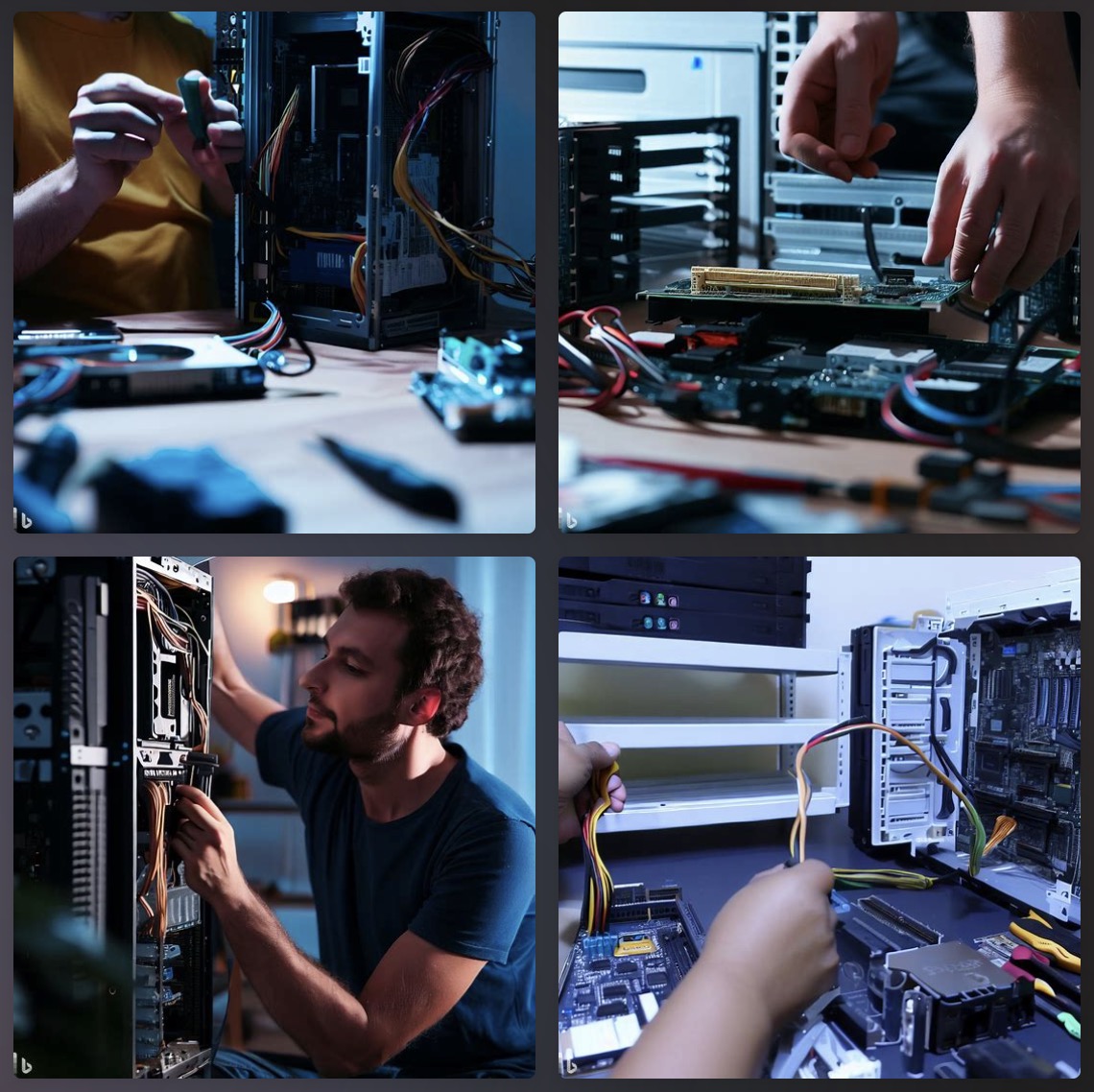
High-Level Roadmap
- Determine Goals and Purpose
- Assess Current Knowledge and Skills
- Plan and Design the Homelab
- Select and Acquire Hardware
- Install and Configure Hardware
- Set Up Networking
- Install and Configure Software
- Implement Security Best Practices
- Install and Configure Homelab Services and Applications
- Establish a Monitoring and Maintenance Routine
- Learn and Experiment
- Share Your Experience with the Community
- Expand and Upgrade Your Homelab
Determining Goals and Purpose
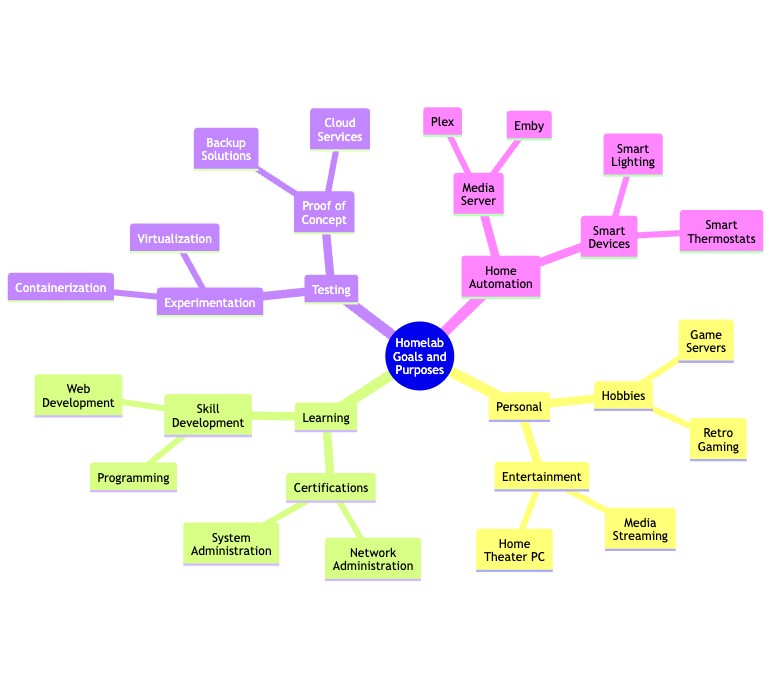
Consider your goals in these areas:
- Personal interests and hobbies
- Learning and skill development
- Testing and experimentation
- Home automation and media server
- Remote work and collaboration
- Business and professional development
- Security and privacy
- Data storage and backup
- Networking and infrastructure
- Cloud computing and virtualization
- Gaming and entertainment
Assessing Current Knowledge and Skills
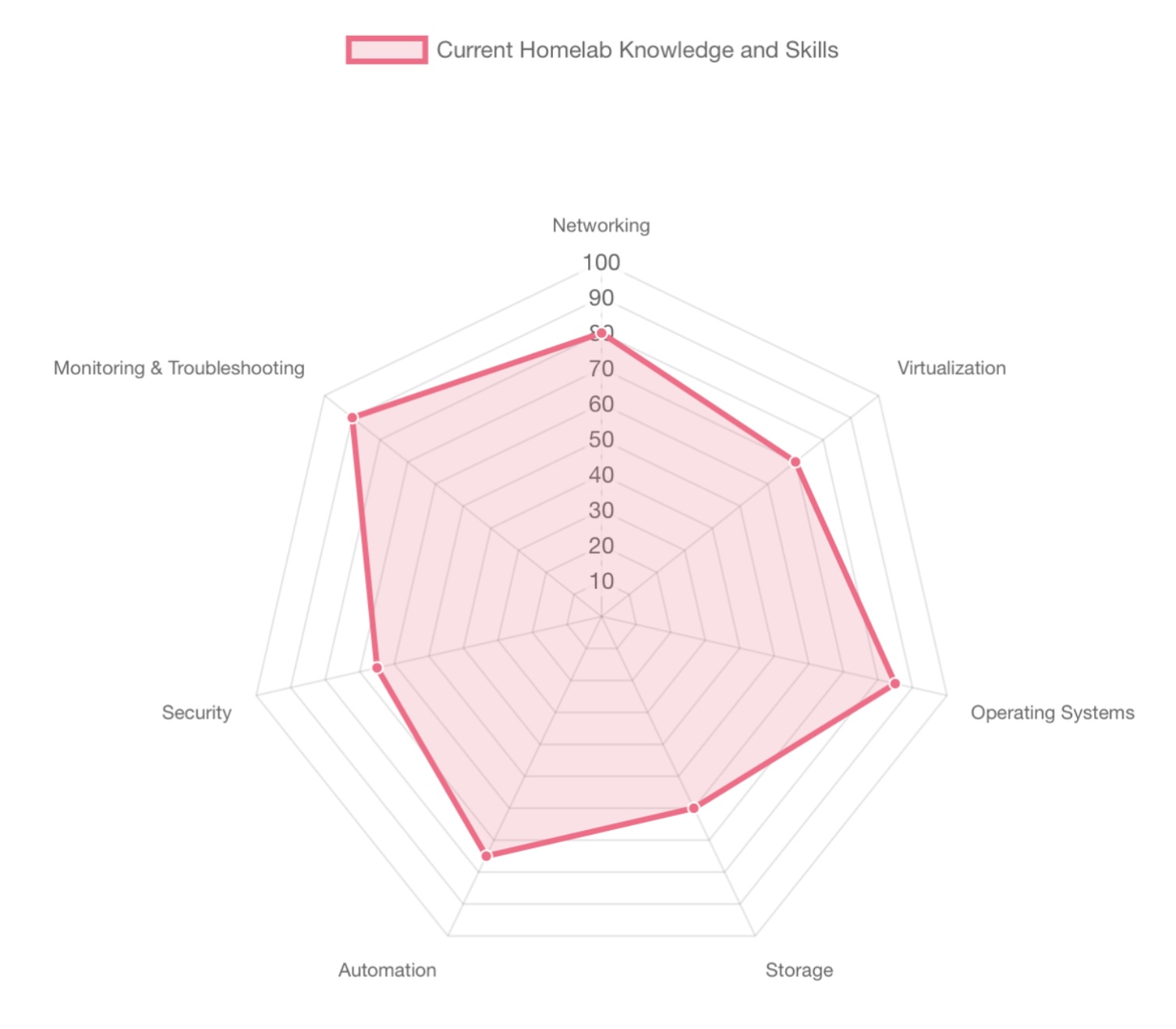
Key areas to evaluate:
- Identifying strengths and weaknesses
- Identifying learning gaps
- Identifying learning objectives
- Creating a learning plan
- Identifying learning resources and tutorials
Planning and Design
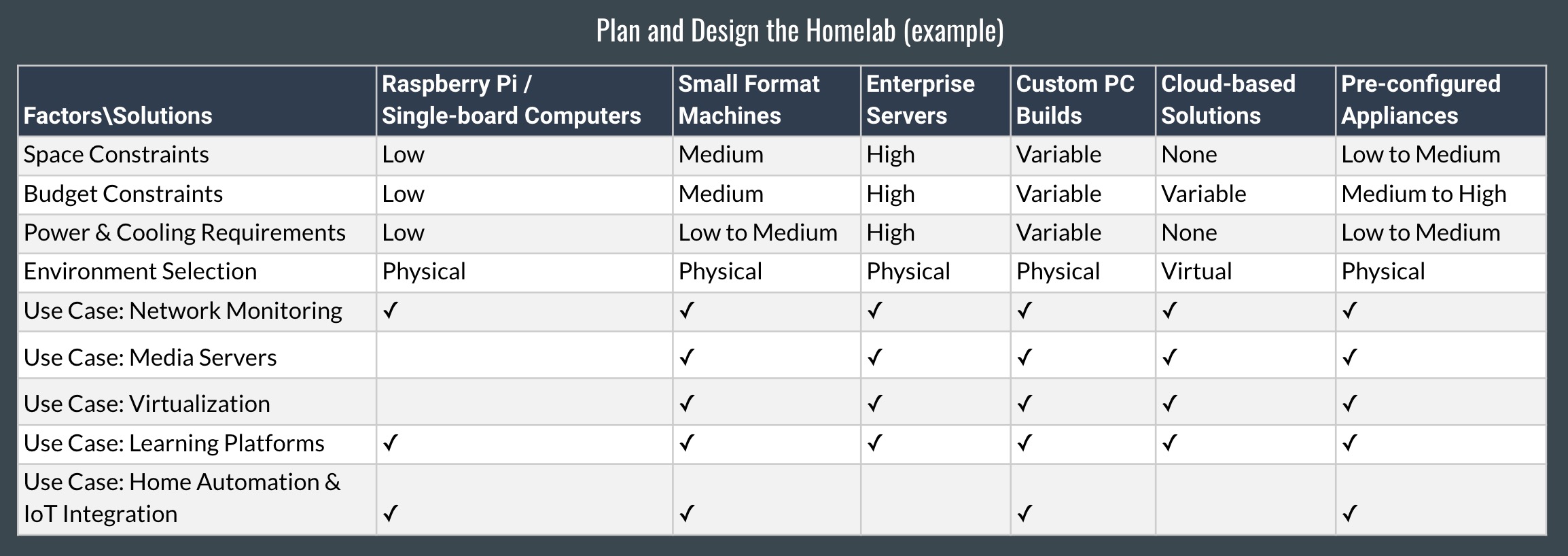
Documentation and Note-Taking Tools
- Markdown editors
- Typora
- Visual Studio Code
- Joplin
- Obsidian
- Note-taking apps
- Notion
- OneNote
- Evernote
- Apple Notes
- Trilium Notes
- Text editors
- Sublime Text
- Wikis
- DokuWiki
- MediaWiki
- BookStack
- Version control
- Git
- GitHub
- GitLab
Diagramming Tools
- Draw.io (diagrams.net)
- Lucidchart
- Microsoft Visio
- yEd Graph Editor
- Excalidraw
- Mermaid
Key Planning Considerations
- Define Your Budget
- Determine Space and Location Requirements
- Consider Power and Cooling Needs
- Choose between Physical and Virtual Environments
- Plan and Design Architecture
- Plan and Design Security Approach
- Consider Scalability and Future Expansion
Hardware Selection and Setup
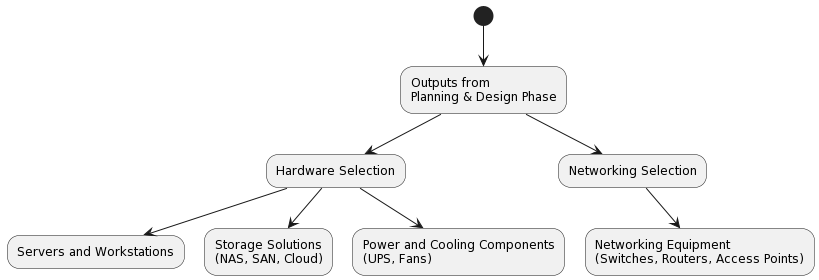
Essential Hardware Components
- Servers and Workstations
- Networking Equipment
- Switches
- Routers
- Access Points
- Storage Solutions
- NAS
- SAN
- Cloud
- Power and Cooling Components
- UPS
- Fans
Hardware Installation
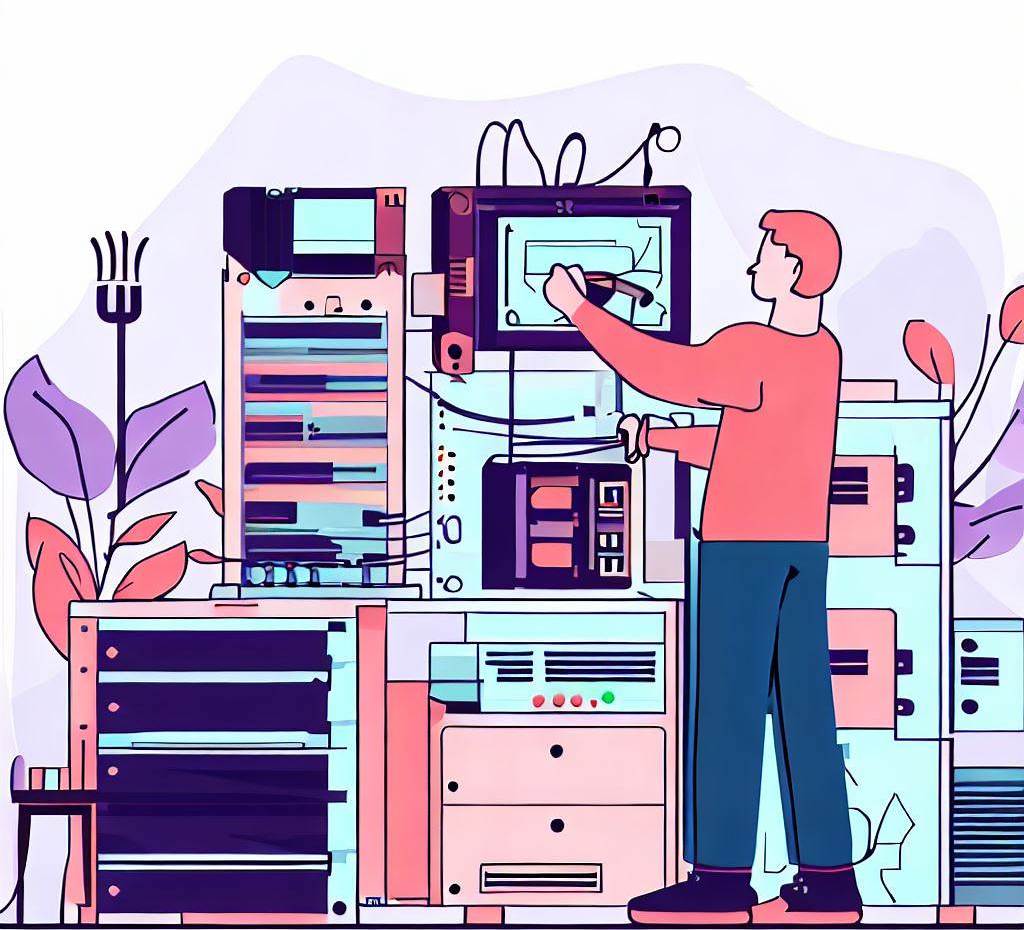
Key steps include:
- Assemble and Organize Hardware Components
- Test Hardware Components for Functionality
- Establish Proper Cable Management
- Configure BIOS/UEFI Settings
Networking Setup
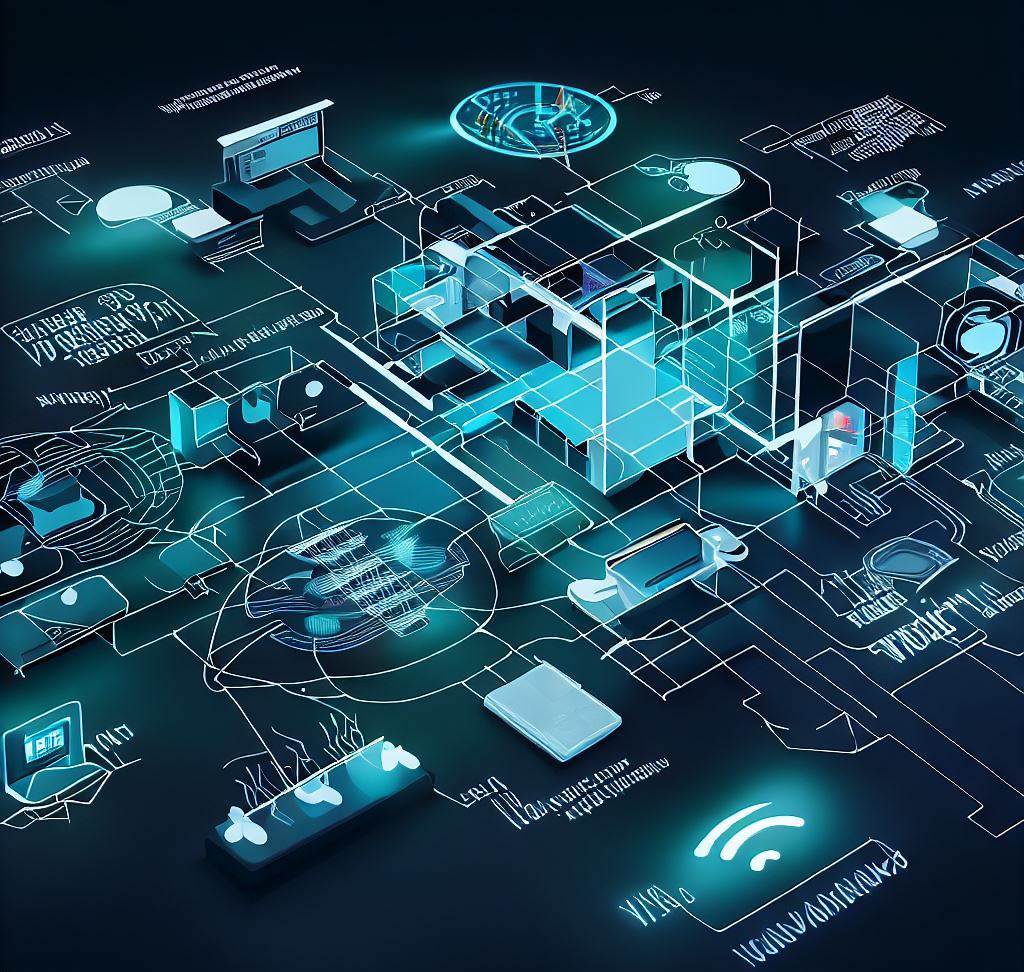
Core Networking Tasks
- Network Topology and Design
- Router and Switch Configuration
- Network Interface Configuration
- Wi-Fi and Access Point Setup
- Network Security Implementation
- Wi-Fi Encryption (WPA2/WPA3)
- Guest Networks and Isolation
- Device and Service Hardening
- Network Segmentation and VLANs
- Remote Access Setup
Software Installation and Configuration

Operating Systems
- Linux (Ubuntu, RHEL, Debian)
- Windows
- MacOS
Hypervisors
- Proxmox
- Microsoft Hyper-V
- VMware ESXi
Containerization
- Docker / Docker Compose
- Portainer
- Kubernetes
- K3S, Rancher, MicroK8s
- Kubernetes Storage (Longhorn, NFS)
- MetalLB
- Kubeapps
Security Implementation
Access Management
- Authelia
- Authentik
- Teleport
- Vault
- Bitwarden
Network Security
- Firewalls and IPS
- Reverse Proxies
- Traefik
- Cloudflare
- SSL/TLS Termination
- Load Balancing (HAProxy)
- DDoS Protection
- DNS Over HTTPS/TLS
- VPN Implementation
- OpenVPN
- WireGuard
- IPsec
- Security Overlay Networks
- Tailscale
- ZeroTier
Additional Security Measures
- Encryption and Secure Communications
- Regular Updates and Patching
- Backup Solutions
- Veeam
- Duplicati
- BorgBackup
Services and Applications
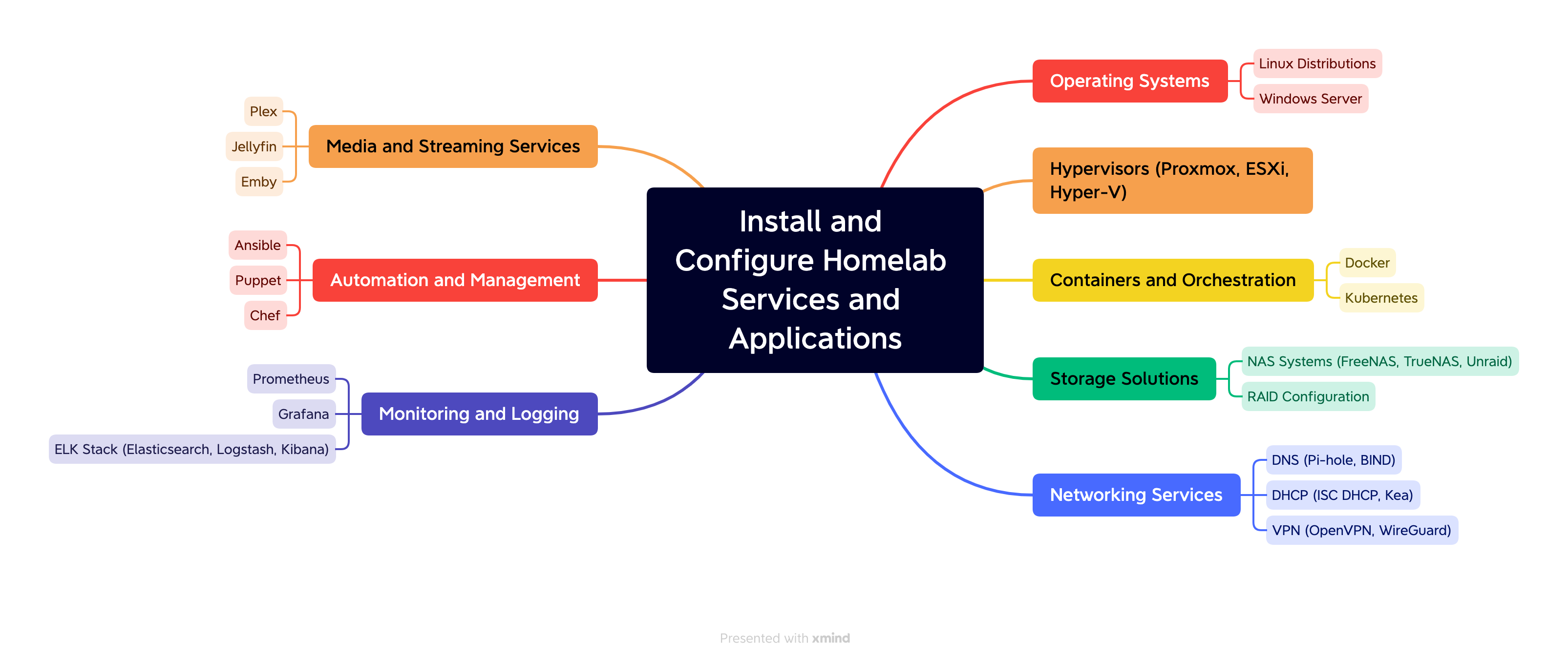
Core Services
- Automation Tools
- Ansible
- Puppet
- Chef
- DNS and DHCP Servers
- bind9
- PiHole
- AdGuard
- GitOps Tools
- FLUX / Argo CD
- CI/CD Solutions
- GitHub Actions
- Storage Solutions
- TrueNAS Scale
- OpenMediaVault
Applications
- Dashboards
- Heimdall
- Organizr
- Homer
- Content Management
- WordPress
- Ghost Blog
- WikiJS
- Web Servers
- Apache
- Nginx
- IIS
- Database Servers
- MySQL
- PostgreSQL
- SQL Server
- Media Servers
- Plex
- Emby
- Jellyfin
- Home Automation
- HomeKit
- HomeBridge
- Home Assistant
- File Synchronization
- Syncthing
- Nextcloud
- ownCloud
Monitoring and Maintenance
Monitoring Tools
- Uptime Kuma
- Grafana
- Prometheus
- Log Management
- Loki
- Promtail
- ELK Stack
- Graylog
Regular Maintenance
- Updates and Patches
- Hardware Cleaning
- Backup Verification
- UPS Monitoring
- NUPS Server
Learning Resources

Online Learning Platforms
- Cisco Learning Labs
- Microsoft Learn
- Pluralsight
- Udemy
- YouTube Channels
- Reddit Communities
- GitHub Repositories
- Stack Overflow
- Katacoda
Certification Paths
- Cisco
- Microsoft
- CompTIA
- Linux Foundation
- Cloud Providers (AWS, GCP, Azure)
- VMware
- Red Hat
Community Engagement

Ways to engage:
- Online Forums and Discussion Groups
- Documentation and Blogging
- Tutorial Creation
- Project Collaboration
- Community Support
Expansion and Growth

Areas for growth:
- Hardware Upgrades
- New Service Integration
- Automation Implementation
- Performance Optimization
- Reliability Improvements
Special Thanks
A huge thank you to these amazing content creators and communities:
- Homelab Reddit Community
- TechnoTim
- Christian Lempa
- DB Tech
- Wolfgang
- Jeff Geerling
- VirtualizationHowTo
- NetworkChuck
- Mactelecom Networks
- Crosstalk Solutions
Tools Used in Creating This Guide
- Mermaid
- PlantText
- Chart.js
- Xmind
- Bing Image Create
- ChatGPT